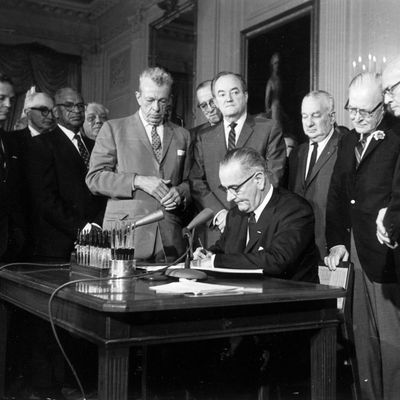
Until not very long ago, voting rights was a genuinely bipartisan cause. Yes, of course, mostly Democratic southern racists had opposed the original Voting Rights Act of 1965, and their conservative Republican ideological heirs periodically fought its renewal and extension over many years. But as recently as 2006, President George W. Bush signed a 25-year extension of the VRA without a lot of controversy. This report from NBC News on the occasion describes a different Republican Party from the one we have today:
The Republican-controlled Congress, eager to improve its standing with minorities ahead of the November elections, pushed the bill through even though key provisions were not set to expire until next year.
“The right of ordinary men and women to determine their own political future lies at the heart of the American experiment,” Bush said. He said the Voting Rights Act proposed and signed by then-President Lyndon Johnson in 1965 “broke the segregationist lock on the voting box.”
Unfortunately, one of the Supreme Court justices appointed by W., Chief Justice John Roberts, helped put the lock back on the voting box in a 2013 decision that neutered one major safeguard of the Voting Rights Act, Shelby County v. Holder. (The Court junked the “preclearance” requirement that forced jurisdictions with a history of discrimination to clear proposed voting changes in advance with the Justice Department.) Now another VRA principle, the doctrine that state and local voting practices that result in discrimination are illegal whether or not malicious intent is demonstrated, could fall to a 6-3 conservative majority on the Court this very term.
Meanwhile, the need for federal voting-rights protections has become urgent once again as Republican-controlled state legislatures in and beyond the South race to restrict the franchise, often in ways that harm minority voters who lean Democratic. While some of this reactionary legislation stems from Donald Trump’s lies about the impact of voting by mail, pre-Trump efforts to dig multiple potholes on the path to the ballot box (voter-roll purges, voter-ID requirements, and cutbacks on in-person early voting opportunities) are evident as well.
So if the Democratic Party is now the sole party of voting rights, what can it do at the federal level to stop and reverse this tide of voter suppression? The maximum answer is in the legislation Democrats pushed through the House on a strict party-line vote on March 3 (as they did last year): H.R 1, the For the People Act, aimed for the first time at enshrining the opportunity to vote as a nationally recognized right for all citizens. As The Atlantic’s Ron Brownstein explained earlier this year, the legislation would systematically address all the roadblocks to full ballot access and fair representation:
For federal elections, it would require every state to do the following: provide online, automatic, and same-day registration; ensure at least 15 days of in-person early voting; provide all voters access to no-excuse, postage-free absentee ballots; and offer drop boxes where they can return those ballots. It would also end gerrymandering by requiring every state to create independent commissions to draw congressional districts; establish a system of public financing for congressional elections; institute new safeguards against foreign interference in elections; and require increased disclosure of the unlimited dark-money campaign spending that was unleashed by the Supreme Court’s 2010 Citizens United ruling, which, like Shelby County, was backed by the Court’s conservative majority.
Critical as the For the People Act would be in ensuring that Republican state legislatures don’t perpetually enthrone anti-democratic (and anti-Democratic) rule, the newly partisan nature of voting rights as an issue guarantees that it has no chance of surviving a Senate Republican filibuster. And as Democrat Joe Manchin made clear this week, there will not be a Senate Democratic majority for eliminating the filibuster in the immediate future. Yes, Democrats should continue to try to convince Manchin and his fellow reform skeptic, Senator Kyrsten Sinema, that exempting voting-rights legislation from the filibuster is not just a worthy task but one that’s essential to their own political survival (not to mention their honor). But as a threshold consideration, perhaps there’s a simpler vehicle for both shaming Republicans and urging Democrats to fight efforts to turn back the clock.
That vehicle may be another piece of legislation passed by the House in 2019 and reintroduced this year: the John Lewis Voting Rights Advancement Act. Put simply, this legislation restores the original structure and scope of the VRA. It creates a new formula for determining jurisdictions that will be subject to the preclearance requirement gutted by Shelby (which basically said the old formula was outmoded) and clarifies that discriminatory results will be grounds for invalidating voting changes. It’s a VRA fix in a very limited sense, which should accordingly be acceptable to at least some Republicans.
Without in any way retreating from the principles incorporated in the For the People Act, Democrats could focus initially on the legislation named for Lewis, whose heroic sacrifices in Selma spurred the enactment of the original Voting Rights Act, and simply demand a restoration of the status quo ante. Perhaps that modest goal could drag a few Senate Republicans across the aisle and put pressure on others (in a way Mitch McConnell avoided by refusing to allow the legislation to come to the floor when he was majority leader) or even convince Manchin and Sinema that Republican obstructionism on so basic a matter is intolerable.
But if all else fails, a new focus on merely restoring the VRA as we knew it — the VRA as George W. Bush and other Republicans supported — would expose how far the GOP has fallen toward the disreputable precedents set by racists in both parties. Today’s Republicans shouldn’t be allowed to hide behind opposition to this or that provision in the wide-ranging For the People Act to distract attention from their abandonment of the most minimal guarantees for voting rights.






























